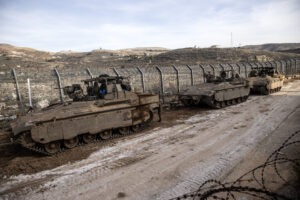The Israeli government on Sunday unanimously approved a plan proposed by Prime Minister Benjamin Netanyahu to accelerate Israeli settlement building in the occupied Golan Heights.
In a statement, Netanyahu’s office said that the government unanimously approved the plan to “encourage demographic growth in Golan settlements and Katzrin, with a total cost exceeding 40 million shekels ($11.2 million).”
Netanyahu’s office stated that the plan was approved “in light of the war and the new front with Syria, and out of a desire to double the population of the Golan.”
The announcement follows a significant shift in the region, as rebel forces toppled the Assad regime, bringing an end to its 54-year rule in Syria just a week earlier.
“This decision strengthens the Golan settlements and includes measures such as education, renewable energy, establishing a student village, and an organizational development plan to support the Golan Regional Council in accommodating new residents,” it added.
Israeli invasion
Historically, Israel has occupied the Syrian Golan Heights since the 1967 Middle East war. Hitherto, Israel has steadily increased its settlements in the region to solidify its control over the territory.
Subscribe to our newsletter and stay updated on the latest news and updates from around the Muslim world!
Currently, approximately 50,000 people live in the occupied Syrian Golan Heights, half of whom are Israeli settlers, while the other half consists of Druze, Alawites and others, according to the Israeli daily Haaretz.
There are 33 Jewish settlements in the occupied Golan, incorporated into what is called the Golan Regional Council.
However since last week, taking advantage of Assad’s fall, Israel has intensified its airstrikes across the entirety of Syria, pushing its troops beyond the Golan Heights.

Last Tuesday it seized territories along the Lebanon-Syria line, coming within 25 kilometers of the Syrian capital, Damascus.
Along with a land grab, Israel intensified its airstrikes against military sites across Syria in violation of the country’s sovereignty.
Israel also declared the collapse of a 1974 disengagement agreement with Syria and deployed its forces within the demilitarised zone in the Golan Heights, in a move widely condemned by the United Nations and several Arab nations.
The Israeli army took control of the mountain summit of Mount Hermon on the Syrian side of the border, and several other locations.
It claims that its actions inside Syrian territory are defensive “to thwart the potential threats from Syria and to prevent the takeover of terrorist elements near our border.”
Although Israel has violated Syrian sovereignty, Netanyahu stated: “We are not interested in conflict with Syria.”
Reactions
The Israeli announcement to double its settlement population in the Golan Heights was condemned by several countries, including Saudi Arabia, Qatar, the United Arab Emirates, Iraq and Turkiye.
In a statement, the Turkish Foreign Ministry said Israel’s ongoing actions are seriously undermining the efforts to bring peace and stability to Syria and further increasing tensions in the region.

Calling the decision “a new stage” in Israeli expansion through occupation, the ministry said: “This step by Israel is a source of grave concern, taken together with Israel’s entry into the area of separation in violation of the 1974 Disengagement Agreement, its advance into adjacent areas and airstrikes in Syria.”
The ministry urged the international community to take “appropriate measures” to end the “illegal steps of the Netanyahu government.”
Egypt has also condemned the Israeli decision, saying the move reflects Tel Aviv’s lack of willingness to achieve peace.
The Egyptian Foreign Ministry called the Israeli decision “a flagrant violation of Syria’s sovereignty and territorial integrity.”
“These plans once again reflect Israel’s lack of willingness to achieve a just peace in the region,” the ministry said.
Egypt said that Israel’s continued expansion in seizing Arab lands and altering the demographic makeup of the occupied territories clearly violates international law.
The UAE also expressed its firm opposition to any actions or activities aimed at altering the legal status of the occupied Golan Heights which threaten Syria’s security, sovereignty and stability.
The Saudi Foreign Ministry in a statement reiterated the kingdom’s condemnation of Israel’s ongoing actions “to sabotage Syria’s opportunities for security and stability.”
“The Golan is an occupied Arab Syrian land,” the ministry stressed.
The Qatari Foreign Ministry called the Israeli decision “a new episode in a series of Israeli aggressions on Syrian territories and a blatant violation of international law.”























